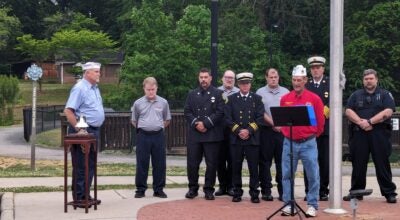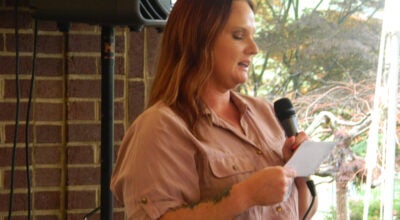PGA's first black player comes to Livingstone
Published 12:00 am Saturday, May 21, 2011
By Laurie D. Willis
Livingstone College News Service
SALISBURY — At some point while caddying at Carolina Golf and Country Club in Charlotte during the mid 1940s, Dr. Charles “Charlie” L. Sifford realized he had a pretty good swing.
“We didn’t have golf in school when I was there, and blacks weren’t allowed to play at the country club,” Sifford said. “I started playing golf because I loved the game, and I love it because it requires you to use your brain.”
Sifford integrated the Professional Golf Association in 1961, paving the way for Lee Elder to become the first black man to play in the Master’s Tournament in 1975 and for Tiger Woods to eventually dominate the game. In 2004, Sifford became the first black man to be inducted into the World Golf Hall of Fame.
Sifford, 88, will headline Livingstone College’s Sixth Annual Faith-Based Celebrity Golf Tournament, being held at the Country Club of Salisbury on June 24. Tournament organizers are ecstatic over having the golf legend at their event.
“I think it’s very fitting that a golfer and humanitarian of his stature would team with Livingstone College, which for 132 years has also served as a beacon of light,” said Dr. Herman J. Felton Jr., vice president of institutional advancement. “Both Dr. Sifford and the college demonstrate the endless possibilities that can come about with access to opportunities.”
Felton said he hopes for great participation from folks in Rowan and neighboring counties. “Given Dr. Sifford’s 2004 induction into the Hall of Fame with the likes of Tom Kite and others, I hope individuals will come out and share in a worthwhile cause with one of the greatest golfers who was instrumental in creating opportunities for all people, not just African-Americans, to enjoy this game.”
Brodie Waters, director of member relations for the World Golf Hall of Fame, said Sifford has left an indelible mark on golf.
“He’s obviously been a great addition to our Hall of Fame,” Waters said. “He’s in the Hall of Fame in the lifetime achievement category for his impact to the game, not just for the doors he opened for African-Americans but also because his story has been inspirational to youth of all races …”
Waters said Sifford embodies perseverance and integrity.
“He has been a great promoter of the game,” Waters said. “He was certainly one of the first African-Americans to break the color barrier. He was the first to play in a PGA tour event, and he was the first African-American to be inducted into the World Golf Hall of Fame. He didn’t necessarily have the amount of wins that some of the others golfers have, but you could also make the argument he didn’t have the opportunity to play as much as they did given the challenges he faced. There’s a whole group of pioneers, if you will, and Dr. Sifford is certainly at the top of that list with many golfers, including Lee Elder.”
Sifford’s impact on the game has “crossed racial barriers and affected girls and minorities of all races, as well as Caucasian golfers,” Waters continued.
“Not only was he a phenomenal player, but it speaks a lot to his character to go through what he went through in order to achieve that success,” Waters said. “I think most of us probably wouldn’t have fought through those barriers and would have given up. He faced things most of us can’t imagine.”
In a recent interview Sifford, mentioned playing in a tournament in Greensboro decades ago.
“I was called to come to Greensboro to play in The Greensboro Open, and I took them up on their invitation,” Sifford said. “I was happy to get the invitation and wanted to see what would happen if I actually went down there and played because it would be the first time blacks played with whites in the South. It was tough, but I wanted to do it. Somebody had to do it.”
Sifford said he was encouraged to go by his late wife, Rose. She said ‘Go down there. They won’t bother you.’ She was right. No one bothered me.”
Although he’ll turn 89 on June 2, Sifford still plays golf occasionally. In fact, he competed in The Liberty Mutual Legends of Golf Tournament in Savannah, Ga., last month.
Sifford’s participation in Livingstone’s tournament means a lot to Andre Springs professionally and personally.
“He’s from my hometown, he grew up with my grandfather, Russell McLaughlin, and they played Little League baseball together,” said Springs, Livingstone’s golf coach. “Charlie Sifford is the one who raised the standards and set the bar to let black people know you can do anything you want to do if you put your mind to it.
“It means a lot that he’s coming to Livingstone,” Springs continued. “He’s the legend of all black golfers … and he’s coming to Salisbury to play with our president, Dr. Jimmy R. Jenkins Sr.”
The Faith-Based Golf Tournament is one of Livingstone College’s biggest fundraisers. The Washington, D.C., chapter of the Livingstone College National Alumni Association also holds an annual golf tournament to raise money for the school.
“It’s not every day that someone who changed history comes to Livingstone College, and we are certainly honored that Dr. Sifford has agreed to participate in our tournament,” Jenkins said. “I look forward to getting a chance to talk with him and am certain those who participate in our event will be glad they did. I truly hope parents will recognize the significance of Dr. Sifford and make it a point to bring their children out for a chance to meet him.”
It seems Sifford’s legend keeps growing.
Black people weren’t allowed to play at Revolution Park Golf Course in Charlotte until 1957 — when Sifford was 35 years old. On May 3, the course was officially renamed The Dr. Charles L. Sifford Golf Course at Revolution Park, and Sifford was on hand — along with Charlotte Mayor Anthony R. Foxx and a World Golf Hall of Fame official — to speak with people and autograph copies of his book, “Just Let Me Play: The Story of Charlie Sifford, the First Black PGA Golfer.”
Sifford said he looks forward to coming to Livingstone College. He said he’d like to see more black people playing golf, especially at the professional level.
“I’m quite sure there are some black kids who could be out there playing, but it’s got to be up to the individual,” Sifford said. “Do you want to put forth the effort?”




